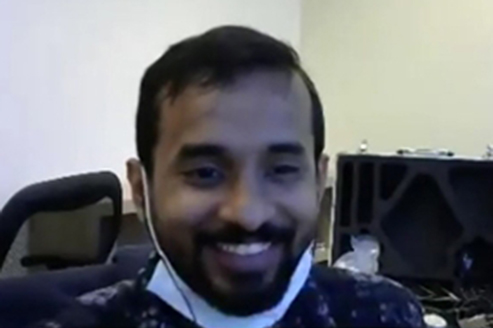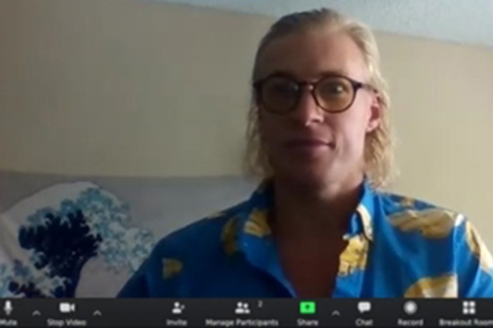

Scripps Fellow and neuroscientist Vinny Augustine, PhD, explores the pathways responsible for some of the most important biological processes in our internal environment. Here, Vinny discusses building electronic circuits, the biology of thirst and collections of rare, ancient coins.
Were you always interested in science growing up?
No, I wouldn’t say so. I was born in a middle-class family in a very small town in India. My dad is an engineer with a routine job and my mom is a nurse, but these are the only two people in my entire close and extended family who even finished college; no one had any connection to scientific research. I guess I was curious of everything. My dad encouraged me to work with electronics when I was in middle school and I clearly remember using LEDs, transistors and resistors in a circuit to build a working burglar alarm. As was typical with many of the middle-class families there, when I got to high school I was pushed towards being an engineer or a doctor. When it was clear I wasn’t going to get into one of the top engineering colleges, I thought I would try out for one of these science institutes that the government had just invested in. It was sheer luck, really. It wasn’t until that first year of my undergraduate that I learned there was something called DNA; I became intrigued by its complexity as an information storage system. And by the time I saw neurons under a microscope, I knew that I wanted to study neuroscience.
After seeing that first neuron, what were the burning questions you chose to pursue in neuroscience?
When I started graduate school at Caltech, I initially wanted to do human research on emotions. But then I took some courses on systems neuroscience and realized I was deeply interested in other circuits, particularly those which seem simple on the surface, but that we really don’t know much about, like thirst. In this case, why do we start and stop drinking so quickly? The liquid you ingest goes from your mouth to your stomach, but it’s a long process before it reaches your bloodstream to restore osmolarity. My graduate work showed that our throat can sense when we are gulping water and not eating something solid, which sends one signal to the brain. Then a sensor in the stomach switches on a second signal if it is specifically water and not something else, like salt, oil or food. These two signals are sent and received by the brain almost instantly, which then controls our behavior to tell us to stop drinking.
What made you choose the Scripps Research Fellows Program? And what is the current focus of your research?
Since I had carved out my own territory during graduate school and it was clear that I wanted to stay in academia, my advisor encouraged me to apply to the Fellows Program, which seemed like an accelerated path compared to a traditional postdoc. I already knew about some of the neuroscience work here and when I came to visit, the faculty were so encouraging about my research proposal. I was also very impressed with the vision that Pete Schultz and Jamie Williamson had for the Fellows Program. That support I got from the other department members, especially Drs. Patapoutian, Stowers and Cline, was ultimately the reason that I joined.
Now that I have my own lab, I’m interested in how the heart, kidneys and the brain talk to each other to help control blood pressure, especially during physical or psychological stress. Blood pressure seems to be a unifying feature of cardiovascular diseases, which are the number one killer in the world. I don’t know anyone who isn’t affected by heart attacks or strokes, whether it’s themselves or their family or friends. If we can understand the molecular machinery in the heart, kidneys and lungs that relays valuable information to the nervous system, we may be able to develop novel therapies that can prevent or restore these long-term abnormalities in blood pressure.
What are your other interests when you’re not in the lab?
As a kid I was very much into collecting coins, and not just other currencies, but also coins from different eras. For example, I have one that has the signature of Constantine and others that are made of copper from ancient Indian dynasties. I used to play bass guitar in a band during my undergraduate degree and I still play a little now at home to keep my mind fresh. The other thing that I’ve recently started to enjoy is cooking, especially combining cuisines from different cultures and seeing what works and what doesn’t; it’s just like an experiment. This experimentation in cooking feels a lot like the blues or jazz, where you don’t necessarily have to follow music theory. Contrast that with baking, which is more like classical music where you have to stick to the rules.